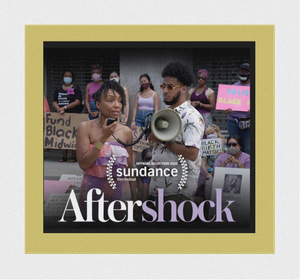When a Black mother dies, there is a ripple effect. - Aftershock
Following the preventable deaths of their loved ones due to childbirth complications, two families galvanized activists, birth workers, and physicians to reckon with one of the most pressing American crises of our time – the US maternal health crisis.
In October 2019, 30-year-old Shamony Gibson tragically died 13 days following the birth of her son. Two months later, we began filming Shamony's surviving mother, Shawnee Benton Gibson, and bereaved partner, Omari Maynard, as they began to process what happened and figure out their new normal.
In April 2020, 26-year-old Amber Rose Isaac died due to an emergency c-section. Within weeks of Amber's death, Omari reaches out to Amber's surviving partner, Bruce McIntyre, and a lifelong bond is formed. Together, Omari and Bruce begin the fight for justice for their partners with their families and community by their side while caring for their children as newly single parents.
Through the film, we witness these two families become ardent activists in the maternal health space, seeking justice through legislation, medical accountability, community, and the power of art. Their work introduces us to a myriad of people, including a growing brotherhood of surviving Black fathers, along with the work of midwives and physicians on the ground fighting for institutional reform. Through their collective journeys, we find ourselves on the front lines of a growing birth justice movement that is demanding systemic change within our medical system and government.
Source: https://picturemotion.com Picture Motion Case Study
So, what are our takeaways?
Culture as Agent and Object of Change
In the introduction, we described culture as both the agent and object of change. We also described stories as stars, narratives as constellations, and culture as a galaxy. In this spotlight on the documentary Aftershock, we begin to see how these things come together.
Film as Culture
The love of films and the art of documentary filmmaking are certainly part of American culture. When that form of pop culture is used to affect the broader community culture, we can see cultural understanding and change begin to take hold. We’ve probably all had personal experiences of being moved by and changed by films.
From Personal Stories to Broader Narratives
What this film, Aftershock, does so well is sharing very personal and intimate stories and connecting those to a broader cultural issue. You understand and grieve with the families who have lost loved ones and children who have lost their mothers. Yet, the film also weaves that loss into a path forward for these families, for society, and communities across the country. They give us hope for a way forward. In the film, you also see the successful birth experience of a third mother, partner, and child and understand some things that made their choices and experiences different. We can witness and appreciate what helped make their birth experience a positive one. Also, you are swept into the world of activism around this issue and are given powerful calls to action to join, donate, share the message, and speak up. Documentary filmmaking, when done well, is a powerful medium for weaving individual stories together into a broader cultural narrative, and this is done exceptionally well in this film.
Point of View is Critical
One of my favorite aspects of this film is that most of the story is told from the point of view of the men who have lost their partners and are struggling to find their way forward as single fathers. We learn how they choose to make sense of their needless personal loss through activism and advocacy. It is a surprising and powerful shift in the narrative to think not only about the mothers and their experiences but also about those who are left behind, whose loss and grief are so overwhelming and so unnecessary. It shakes us out of our complacency and disrupts any current narratives we already have. It forces us to wake up, listen up, and consider this issue anew.
From Story to Narrative to Action
We mentioned that this film is being promoted through screenings that facilitate broader discussion. There is a robust impact strategy related to this film, reaching into medical centers within communities, serving as continuing education for healthcare workers, and working to drive change in the broader culture. Associated with the film are powerful calls to action that individuals and groups can consider. To have the best chance to reach its full impact, Aftershock is being promoted by an agency, Picture Motion. They term themselves as an “impact agency” and state clearly that they believe that,
Stories can change the world.
They consider themselves as,
The leading social impact agency developing award-winning advocacy and marketing campaigns for an array of media and entertainment including films, television, books, stage-plays, music, podcasts, and more.
They do the work of making culture both an agent of change and the object of change.
They have produced and promoted a number of powerful films. However, I’d like to call out one more of their films, The Color of Care, which Oprah Winfrey and Harpo Productions produced. This documentary deals with the broader issues of inequities in our healthcare system. Like AfterShock, it is accompanied by a robust promotion plan to drive awareness and social action.
It Takes More
The work that Picture Motion does reminds us that telling a great story and building that into a narrative is not enough. While that is important and creates some level of change, broad cultural change requires a strategy for engagement, calls to action, partners, and supporting materials. Change is work, but it is possible.


